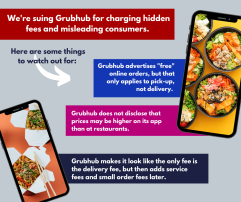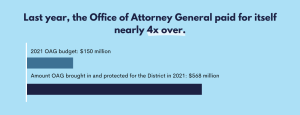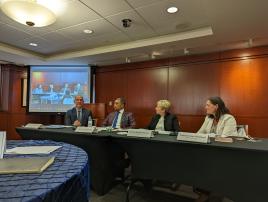We Sued Grubhub to Protect Residents & Local Restaurants From Harmful and Deceptive Business Practices
Last week, we filed a lawsuit against Grubhub, a food delivery company, for charging hidden fees, misleading District residents, and exploiting local restaurants to boost its own profits. And it did all of this as residents and DC restaurants struggled during the heart of the COVID-19 pandemic.
In addition to charging hidden fees, our suit alleges Grubhub also used bait-and-switch advertising tactics—which are illegal—and failed to disclose that prices are higher on its app and website than at restaurants.
For example, in March and April 2020, Grubhub deceived users with a promotion claiming to support local restaurants at the beginning of the pandemic. But the discount Grubhub offered consumers came out of the pockets of already-struggling restaurants.
With this lawsuit, we are seeking to force Grubhub to end its deceptive marketing practices, be truthful about prices and fees, provide restitution to affected consumers, and pay penalties for violating District law. Consumers don’t mind paying for delivery fees, but Grubhub needs to be honest about those fees in the first place.
Protecting District residents is my top priority, and every day we work hard to hold corporations and other bad actors accountable if they cause harm. This lawsuit builds on our work to go after companies like Doordash and Instacart for misleading consumers and stealing tips from workers.
We won’t allow any company to profit by tricking consumers or taking advantage of local small businesses. It doesn’t matter if you’re a brick-and-mortar company or a “gig economy” business—the same rules apply to all.
To learn more about this lawsuit, read this DCist article or this or this Washington Post article.
Thank you.
Karl A. Racine
Attorney General
Our Office is a Worthy Investment & Pays for Itself Nearly Four Times Over
Last week, I testified before the DC Council about my office’s budget proposal to ensure we get the resources to continue our work to make the District fairer, safer, and more just for all residents. During my final budget hearing as attorney general, we talked about the numbers, and how my office is not only worth every dollar invested in it, but provides a great return to District residents and the government. Every dollar invested in our office—that is, in our nearly 700 lawyers and professionals and infrastructure—is an investment in the District itself.
This past year, our office’s legal work on behalf of the District has brought in and protected $570 million for the District. On top of this, we secured $80 million for the District from settlements from several cases against distributors and manufacturers of opioids that will be used to support victims of the opioid crisis for years to come. We asked the Council to invest in the strength and independence of the Office of Attorney General, no matter who leads the agency in the future. We want to make sure that the next attorney general can continue to build on the progress we have made over the past seven years to create one of the best attorney general offices in the country.
Watch the hearing here and learn more in this thread.
Speaking at George Washington University Law School About Equality in Law Enforcement and Criminal Law
Earlier this month, as part of as part of George Washington University Law School’s 2022 Health Law Symposium entitled “Just Health,” I spoke on a panel about how we can reverse America’s legacy of racial discrimination in the criminal justice system—one of the social determinants of health. During this panel, we also discussed how we can achieve greater equality in law enforcement and criminal law.
I talked about how prosecutors are uniquely positioned to do this critical work. We must use our discretion to hold kids accountable while simultaneously ensuring we rehabilitate them, which in turn makes our communities safer. We must work together to fix the root causes of crime and violence – poverty, hopelessness, and trauma – to truly address the racial disparities in the justice system. And we must have outside-the-box thinking and new approaches for the success of the future of the criminal justice system.
Taking Action Against Pepco for Failing to Properly Operate Community Solar Programs
Last week, I announced that my office and the Office of the People’s Counsel (OPC) filed a complaint against Pepco for systemically mishandling community solar projects, potentially overcharging more than 6,800 District households on their monthly electric bills, and undermining the District’s efforts to meet its clean energy goals. The District has tried to work with Pepco for nearly two years to address problems with community solar programs and ensure 6,800 households—including thousands of low-income residents—get the solar energy discounts they are owed. Unfortunately, these programs are still not working as intended, and residents continue to get overcharged on their electric bills. We’re taking action now to uncover the true extent of Pepco’s mishandling of these programs—and to force the company to uphold its legal obligations so residents can receive the discounts they are entitled to and the District can continue to build a more sustainable and equitable future. Read more from DCist.
Update: Express Homebuyers Consumer Complaint
Last December, my office sent out a consumer alert detailing our complaint against Express Homebuyers—a real estate and foreclosure services company—after the company sent false and misleading letters to over 10,000 District homeowners claiming that they owed past due property taxes and needed to act quickly to prevent tax sales. Last week, we received some good news: Express Homebuyers will be required to send an alert to all District residents that received the misleading letters to correct their misrepresentations. Additionally, the company cannot create advertisements that violate District law, or advertise, promote, or engage in for-profit foreclosures rescue services.
Consumer Alert: One Ring Scams
Sometimes when scammers call, they don’t want you to answer the phone. Instead, they want you to call back so that you're charged long distance fees. The “one ring” scam is when scammers call you from an international number, hang up after letting it ring once, and hope that you call them back so that you will be charged long distance fees. To increase the likelihood that you call back, scammers will call from numbers that seem to have U.S. area codes or use “spoofing” techniques that further mask the number’s origin on your Caller ID. Once you call back, the scammer will put you on hold or try to keep you on the line for as long as possible to rack up per minute fees. Click here to learn about this "one ring" scam and tips for avoiding a surprise phone bill.
Enjoy the Cherry Blossoms!
The National Cherry Blossom festival runs from March 20-April 17. Last week was peak bloom. Above are photos some of my colleagues took. If you haven’t already, I encourage you to go see them—they're even more beautiful in person.





